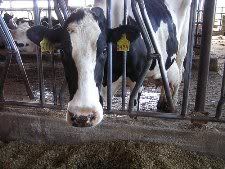Religion
The following section is directed at believers in God and those who identify with various religious faiths. Dairy Cow Diary does not endorse any specific religious faith, including atheism and agnosticism. However, it does assert that the goodness of practicing compassion and the obligation to try to refrain from inflicting avoidable harm to others are compatible with all major religious and secular moral codes.
Didn’t God put animals here for us to use?
Pretending that the easily avoidable cruelties in dairy are not only sanctioned but prescribed by God is perverse. In the Bible, animals were created before humans, and therefore for purposes that had nothing to do with humans. Right after God grants dominion, He clarifies it – as if to make sure we don’t get the wrong idea – by specifying a vegan diet. Stealing baby calves from their mothers, forcing cows to grossly overproduce milk, killing animals not out of necessity but out of greed and power – these practices violently contradict the frequently stated calls in the Bible for mercy and humility. They violate the Golden Rule and the spirit of “Thou shalt not kill.” Do not blame God for your participation in avoidable cruelty. However, be thankful you are blessed with the power to change, and to show compassion to all God’s creatures.
Didn’t God command animal sacrifices?
Although there is some animal sacrifice in the Old Testament, because that was the practice at the time, the later prophets repeatedly tell us that God cares about the welfare of all creatures and that the sacrifice of animals is an abomination in the eyes of God.
I have no pleasure in the blood of bulls and lambs and goats…Your hands are full of blood; wash and make yourselves clean. Take your evil deeds out of my sight. — Isaiah
Though they sacrifice flesh as offerings to me and eat them, I the Lord will not accept them. — Hosea
When you offer me holocausts, I reject your oblations, and refuse to look at your sacrifices of fattened cattle… — Amos
Micah makes the connection between animal sacrifice and the sacrifice of human flesh in the following passage, and concludes that God wants neither:
Shall I come to Him with burnt offerings, with yearling calves? Does the Lord take delight in thousands of rams, in ten thousand riverse of oil: Shall I present my firstborn for my rebellious acts, the fruit of my body for the sin of my soul? He has told you, O man what is good…do justice, to love kindness, and to walk humbly with your God.
Isaiah speaks of the peaceful future that God desires, where “they do not hurt, nor harm, on all my holy mountain.”
Jesus risked his life when he banished the animal sacrificers from the Temple, and twice he quotes Hosea, saying “I desire mercy and not sacrifice.” Jesus practiced and counseled self-sacrifice and humility, not sacrificing innocent others. He tells people to honor God through how they live: “[P]resent your bodies as a living sacrifice, holy and acceptable to God, which is your spiritual worship” [Rom. 12:1].
